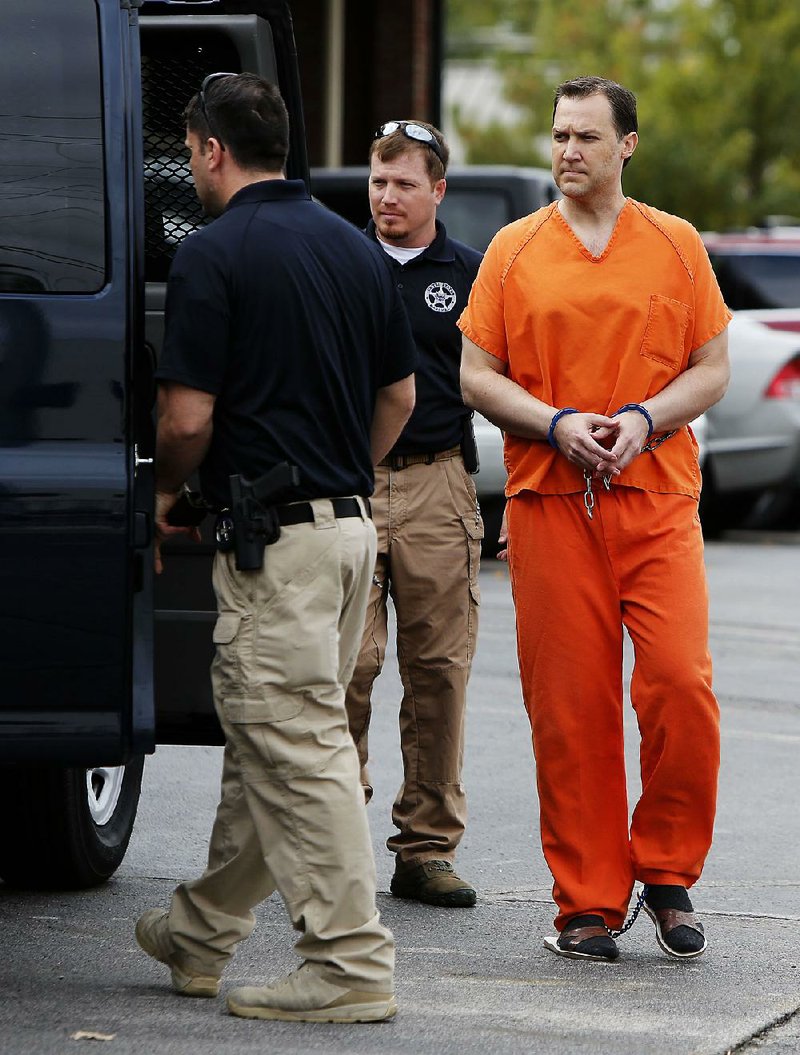FORT SMITH -- Bankers did not check out the assets in personal financial statements that former Northwest Arkansas developer Brandon Barber submitted in 2005 and 2007 to obtain loans on which he later defaulted.
Bankers with Legacy Bank of Springdale and Enterprise Bank of St. Louis, Mo., told U.S. District Judge P.K. Holmes III on Monday that they did not look into the financial condition of the corporations and limited liability companies that formed the bulk of assets Barber listed in personal financial statements he submitted as part of his loan applications.
They testified they relied on information in Barber's tax returns, his reputation and his statements of cash holdings in deciding whether to loan him millions to build the Legacy Building and Bellafont Retail Village. An FBI agent testified Monday that Barber inflated the cash he said he had in order to entice the banks to make the loans.
The bankers testified Monday in a 90-minute hearing before Holmes on the amount of restitution Barber should pay on the nearly $19.5 million in loans he took out with Legacy Bank, a $17.1 million loan from Enterprise Bank and a $550,000 kickback Barber and co-conspirators received from a $2.1 million loan from First Federal Bank.
Holmes did not make a ruling from the bench Monday but said he would issue his decision, possibly in a week, in his final sentencing order for Barber.
Barber, 38, was sentenced Oct. 28 to five years, five months in prison after pleading guilty in July 2013 to conspiracy to commit bankruptcy fraud, money laundering and conspiracy to commit bank fraud. Barber and others originally were charged with 30 offenses in two indictments unsealed in March 2013.
Barber has been held in the Washington County jail since June 2013 after a federal magistrate determined he had violated the terms of his pretrial release.
The government claimed Barber should be ordered to pay $16.2 million in restitution -- nearly $7.5 million for the Legacy loan, $8.2 million for the Enterprise loan and the $550,000 kickback from the First Federal Bank loan.
Barber's Rogers attorney, Asa Hutchinson III, wrote that Barber should be ordered to provide restitution only for the amount of the kickback.
During Monday's hearing, Holmes questioned Legacy Vice President Craig Huston about the $16.7 million loan the bank made to Barber in 2005 to fund construction of the seven-story, 37-condominium Legacy Building in Fayetteville. The bank later loaned Barber another $2.7 million to finish construction.
It later was revealed that Barber had spent money from those loans on other projects not part of the Legacy or Bellafont projects, which FBI forensic accountant Steven Williams testified Monday was why Barber defaulted on the loans.
For example, Williams said, one draw of money on the Legacy loan totaled nearly $1.2 million. Initially, it went into Barber's Lynnkohn LLC account, the Barber company on the Legacy project.
But Williams said he traced $205,000 that Barber moved to an account in the name of Brandon or Keri Barber. Keri was Barber's wife at the time. From there, Barber transferred $193,000 to a Barber construction account, and three checks were written from that account to pay expenses in three other real estate construction projects, Williams said.
Huston testified that at one point, he went to Barber's offices in Fayetteville and went through the check register for the Legacy project. He said he found $800,000 had been used for things other than for Legacy construction.
NW News on 01/06/2015

